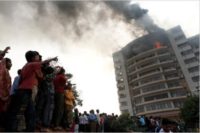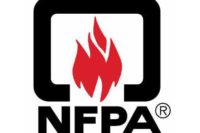The National Fire Protection Association (NFPA) has released the Bangladesh Ready-Made Garment (RMG) Industry High-Level Assessment Report, an appraisal and gap analysis of Bangladesh fire and building safety standards, protocols, inspection procedures and training programs. The final report includes short-term and long-term recommendations that provide a road map for sustainable electrical, fire and life safety in RMG manufacturing facilities in Bangladesh.
NFPA and the University of Maryland were invited by the Alliance for Bangladesh Worker Safety (the Alliance) to provide an independent review of their factory upgrade program designed to improve worker safety. The Alliance, made up of 28 North American brands and retailers, was organized in 2013 as a 5-year initiative to improve safety and empower workers in the Bangladesh factories from which they source.
Site visits, interviews
The Alliance identified a sample of 14 factories currently undergoing remediation in the Dhaka region of Bangladesh, and arranged for the project team to visit the sites, observe building operations and interview key stakeholders in the building industry. Based on these activities, NFPA made recommendations and suggested processes for the Alliance, government officials and other stakeholders to explore or undertake in an effort to institutionalize sustainable worker safety enforcement programs and infrastructure; factory fire, electrical and life safety best practices; and training for ongoing worker safety initiatives in Bangladesh.
“The Alliance has been working hard to meet its goal to create a safe environment for workers in Bangladesh's factories, and its’ results-oriented process has helped make progress within the industry,” said Don Bliss, NFPA’s vice president of Field Operations. "Their work clearly aligns with our global mission of helping to save lives and eliminate loss due to fire, electrical and related hazards.”
The report outlines short-term recommendations to further improve the fire safety of the RMG factories in Bangladesh, including measures that the Alliance has already begun to implement, such as increasing the capacity to review remediation plans and expanding training programs. The report also provides long-term recommendations for the Bangladeshi government and other stakeholders related to capacity buildings and inspections.
"A moral imperative"
“We believe that improving worker safety in Bangladesh’s factories is a moral imperative, and we’ve made great progress the last three years in improving factory safety and empowering workers—leading to a dramatic reduction in the number of fires and fire-related deaths in factories from 2012 to 2015,” said Ellen Tauscher, chairwoman of the Alliance. “We are grateful to NFPA and the University of Maryland for bringing their expertise and objectivity to help us identify additional areas where we can improve our programs.”
The success of the remediation, training and other suggested methods for improvement after the Alliance timeframe expires will depend on the concerted efforts of all stakeholders in Bangladesh RMG fire and life safety.
About The Alliance for Bangladesh Worker Safety
The Alliance for Bangladesh Worker Safety is a legally binding, five-year commitment between 28 global apparel brands dedicated to improving safety in Bangladesh’s ready-made garment (RMG) factories. The Alliance holds each Member and its factories accountable to operating workplaces that effectively ensure building and fire safety. In partnership with the government of Bangladesh, trade unions and employers, the Alliance helps implement lasting reforms that improve worker safety throughout the Bangladesh garment industry and that ultimately create sustainable and positive economic development for Bangladesh.
About the National Fire Protection Association (NFPA)
Founded in 1896, NFPA is a global, nonprofit organization devoted to eliminating death, injury, property and economic loss due to fire, electrical and related hazards. The association delivers information and knowledge through more than 300 consensus codes and standards, research, training, education, outreach and advocacy; and by partnering with others who share an interest in furthering the NFPA mission. For more information visit www.nfpa.org. All NFPA codes and standards can be viewed online for free at www.nfpa.org/freeaccess.





